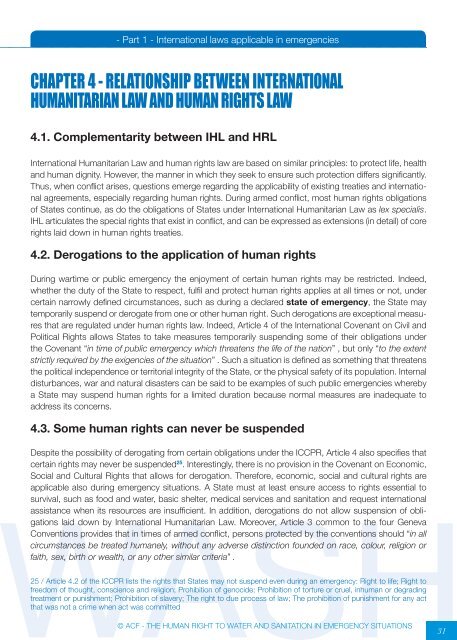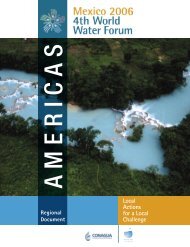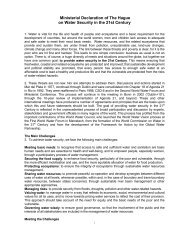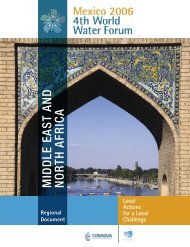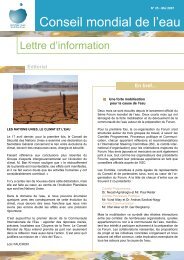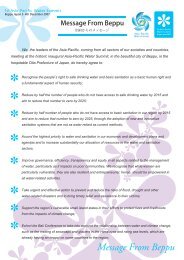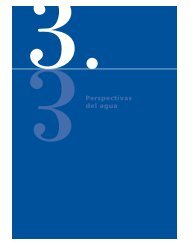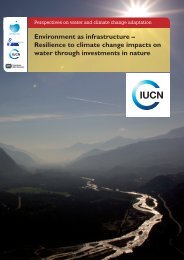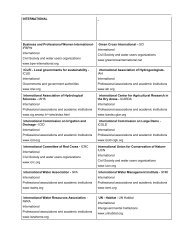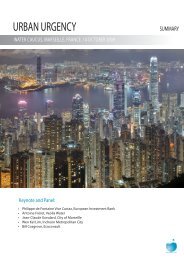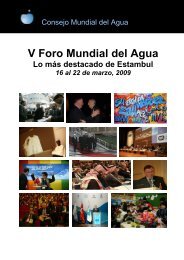the human right to water and sanitation in emergency situations
the human right to water and sanitation in emergency situations
the human right to water and sanitation in emergency situations
You also want an ePaper? Increase the reach of your titles
YUMPU automatically turns print PDFs into web optimized ePapers that Google loves.
- Part 1 - International laws applicable <strong>in</strong> emergencies<br />
CHApTER 4 - RElATIONSHIp bETWEEN INTERNATIONAl<br />
HUMANITARIAN lAW AND HUMAN RIGHTS lAW<br />
4.1. Complementarity between IHL <strong>and</strong> HRL<br />
International Humanitarian Law <strong>and</strong> <strong>human</strong> <strong>right</strong>s law are based on similar pr<strong>in</strong>ciples: <strong>to</strong> protect life, health<br />
<strong>and</strong> <strong>human</strong> dignity. However, <strong>the</strong> manner <strong>in</strong> which <strong>the</strong>y seek <strong>to</strong> ensure such protection differs significantly.<br />
Thus, when conflict arises, questions emerge regard<strong>in</strong>g <strong>the</strong> applicability of exist<strong>in</strong>g treaties <strong>and</strong> <strong>in</strong>ternational<br />
agreements, especially regard<strong>in</strong>g <strong>human</strong> <strong>right</strong>s. Dur<strong>in</strong>g armed conflict, most <strong>human</strong> <strong>right</strong>s obligations<br />
of States cont<strong>in</strong>ue, as do <strong>the</strong> obligations of States under International Humanitarian Law as lex specialis.<br />
IHL articulates <strong>the</strong> special <strong>right</strong>s that exist <strong>in</strong> conflict, <strong>and</strong> can be expressed as extensions (<strong>in</strong> detail) of core<br />
<strong>right</strong>s laid down <strong>in</strong> <strong>human</strong> <strong>right</strong>s treaties.<br />
4.2. Derogations <strong>to</strong> <strong>the</strong> application of <strong>human</strong> <strong>right</strong>s<br />
Dur<strong>in</strong>g wartime or public <strong>emergency</strong> <strong>the</strong> enjoyment of certa<strong>in</strong> <strong>human</strong> <strong>right</strong>s may be restricted. Indeed,<br />
whe<strong>the</strong>r <strong>the</strong> duty of <strong>the</strong> State <strong>to</strong> respect, fulfil <strong>and</strong> protect <strong>human</strong> <strong>right</strong>s applies at all times or not, under<br />
certa<strong>in</strong> narrowly def<strong>in</strong>ed circumstances, such as dur<strong>in</strong>g a declared state of <strong>emergency</strong>, <strong>the</strong> State may<br />
temporarily suspend or derogate from one or o<strong>the</strong>r <strong>human</strong> <strong>right</strong>. Such derogations are exceptional measures<br />
that are regulated under <strong>human</strong> <strong>right</strong>s law. Indeed, Article 4 of <strong>the</strong> International Covenant on Civil <strong>and</strong><br />
Political Rights allows States <strong>to</strong> take measures temporarily suspend<strong>in</strong>g some of <strong>the</strong>ir obligations under<br />
<strong>the</strong> Covenant “<strong>in</strong> time of public <strong>emergency</strong> which threatens <strong>the</strong> life of <strong>the</strong> nation” , but only “<strong>to</strong> <strong>the</strong> extent<br />
strictly required by <strong>the</strong> exigencies of <strong>the</strong> situation” . Such a situation is def<strong>in</strong>ed as someth<strong>in</strong>g that threatens<br />
<strong>the</strong> political <strong>in</strong>dependence or terri<strong>to</strong>rial <strong>in</strong>tegrity of <strong>the</strong> State, or <strong>the</strong> physical safety of its population. Internal<br />
disturbances, war <strong>and</strong> natural disasters can be said <strong>to</strong> be examples of such public emergencies whereby<br />
a State may suspend <strong>human</strong> <strong>right</strong>s for a limited duration because normal measures are <strong>in</strong>adequate <strong>to</strong><br />
address its concerns.<br />
4.3. Some <strong>human</strong> <strong>right</strong>s can never be suspended<br />
Despite <strong>the</strong> possibility of derogat<strong>in</strong>g from certa<strong>in</strong> obligations under <strong>the</strong> ICCPR, Article 4 also specifies that<br />
certa<strong>in</strong> <strong>right</strong>s may never be suspended 25 . Interest<strong>in</strong>gly, <strong>the</strong>re is no provision <strong>in</strong> <strong>the</strong> Covenant on Economic,<br />
Social <strong>and</strong> Cultural Rights that allows for derogation. Therefore, economic, social <strong>and</strong> cultural <strong>right</strong>s are<br />
applicable also dur<strong>in</strong>g <strong>emergency</strong> <strong>situations</strong>. A State must at least ensure access <strong>to</strong> <strong>right</strong>s essential <strong>to</strong><br />
survival, such as food <strong>and</strong> <strong>water</strong>, basic shelter, medical services <strong>and</strong> <strong>sanitation</strong> <strong>and</strong> request <strong>in</strong>ternational<br />
assistance when its resources are <strong>in</strong>sufficient. In addition, derogations do not allow suspension of obligations<br />
laid down by International Humanitarian Law. Moreover, Article 3 common <strong>to</strong> <strong>the</strong> four Geneva<br />
Conventions provides that <strong>in</strong> times of armed conflict, persons protected by <strong>the</strong> conventions should “<strong>in</strong> all<br />
circumstances be treated <strong>human</strong>ely, without any adverse dist<strong>in</strong>ction founded on race, colour, religion or<br />
faith, sex, birth or wealth, or any o<strong>the</strong>r similar criteria” .<br />
25 / Article 4.2 of <strong>the</strong> ICCPR lists <strong>the</strong> <strong>right</strong>s that States may not suspend even dur<strong>in</strong>g an <strong>emergency</strong>: Right <strong>to</strong> life; Right <strong>to</strong><br />
freedom of thought, conscience <strong>and</strong> religion; Prohibition of genocide; Prohibition of <strong>to</strong>rture or cruel, <strong>in</strong><strong>human</strong> or degrad<strong>in</strong>g<br />
treatment or punishment; Prohibition of slavery; The <strong>right</strong> <strong>to</strong> due process of law; The prohibition of punishment for any act<br />
that was not a crime when act was committed<br />
© ACF - THE HUMAN RIGHT TO WATER AND SANITATION IN EMERGENCY SITUATIONS<br />
31


